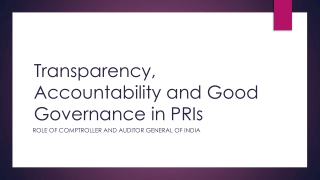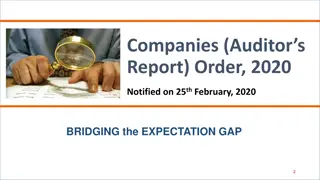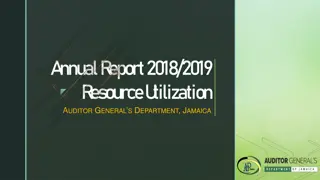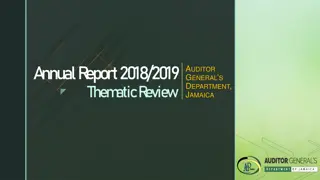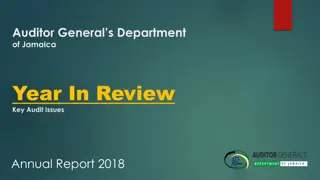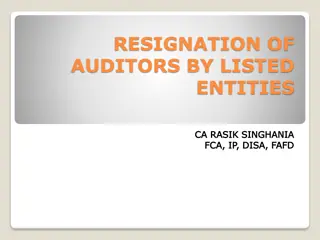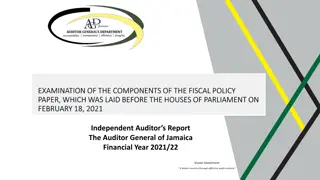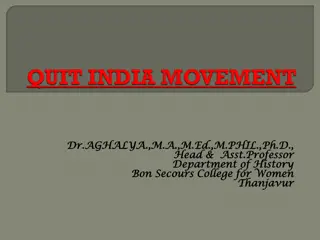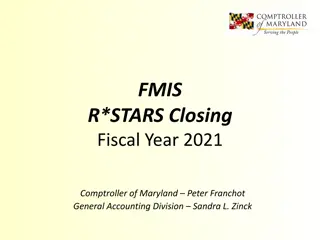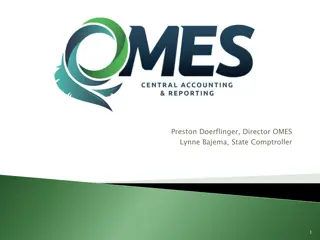Role and Responsibilities of the Comptroller and Auditor General of India
The Comptroller and Auditor General (CAG) of India is a vital constitutional functionary responsible for auditing government finances at various levels. Appointed by the President, the CAG ensures reliability and validity of budget information and expenditure. With a tenure of six years, the CAG audits public funds, government enterprises, and autonomous bodies, safeguarding the public purse and financial integrity of the country.
Download Presentation

Please find below an Image/Link to download the presentation.
The content on the website is provided AS IS for your information and personal use only. It may not be sold, licensed, or shared on other websites without obtaining consent from the author. Download presentation by click this link. If you encounter any issues during the download, it is possible that the publisher has removed the file from their server.
E N D
Presentation Transcript
The CAG The Comptroller and Auditor General fourth sem. Hons Paper 403 By Dr. Rakhi Moni Gogoi HOD, Pol.Sc.
The Comptroller and Auditor General of india Audits are performed to ascertain the validity and reliability of information about budget and expenditure. The Comptroller and Auditor General is one of the highest authority in India. It is an independent authority. It is also known as CAG. Before independence of India there was Government of India Audits and accounts office. It was enacted via Government of India Audits and Accounts Order , 1926. The present set up of the same is based on that 1926 order. The article 148 of the Indian Constitution stated about the office of the CAG. He is a constitutional functionary, he is primarily entrusted with the responsibility to audit the accounts and related activities of the three tiers of government federal, provincial and local; the state owned public sector commercial enterprises; and autonomous bodies financed by the federal and provincial governments. His reports are laid before the parliament and legislatures of the provinces.
Appointment- the Comptroller and Auditor General is Appointed by the President of India . his salary is coming from the consolidated fund of India. He can resign from his office any time by addressing resignation letter to the President of India. He can be removed from his office by the President of India on the recommendation of Parliament on the ground of misconduct and misbehavior Tenure The CAG has a tenure of six years or upto the age of sixty five years.
Powers and functions of CAG The CAG is the guardian of the public purse and controls the entire financial system of the country at both the levels the Centre and the state. His powers and function are followed - 1. The CAG audits the accounts related to all expenditure from the Consolidated Fund of India, consolidated fund of each state and consolidated fund of each union territory having a Legislative Assembly. 2. He audits all expenditure from the Contingency Fund of India and the Public Account of India as well as the contingency fund of each state and the public account of each state. 3. The CAG audits all trading, manufacturing, profit and loss accounts, balance sheets and other subsidiary accounts kept by any department of the Central Government and state governments. 4. He audits the receipts and expenditure of the Centre and each state to satisfy himself that the rules and procedures in that behalf are designed to secure an effective check on the assessment, collection and proper allocation of revenue.
5. He audits the receipts and expenditure of the following: (a) All bodies and authorities substantially financed from the Central or state revenues; (b) Government companies; and (c) Other corporations and bodies, when so required by related laws. He audits all transactions of the Central and state governments related to debt, sinking funds, deposits, advances, suspense accounts and remittance business. He also audits receipts, stock accounts and others, with approval of the President, or when required by the President. 7. He audits the accounts of any other authority when requested by the President or Governor. For example, the audit of local bodies. 6.
8. He advises the President with regard to prescription of the form in which the accounts of the Centre and the states shall be kept (Article 150). 9. He submits his audit reports relating to the accounts of the Centre to President, who shall, in turn, place them before both the Houses of Parliament (Article 151). 10. He submits his audit reports relating to the accounts of a state to governor, who shall, in turn, place them before the state legislature (Article 151). 11. He ascertains and certifies the net proceeds of any tax or duty (Article 279). His certificate is final. The net proceeds means the proceeds of a tax or a duty minus the cost of collection. 12. He acts as a guide, friend and philosopher of the Public Accounts Committee of the Parliament. 13. He compiles and maintains the accounts of state governments.
In 1976, he was relieved of his responsibilities with regard to the compilation and maintenance of accounts of the Central Government due to the separation of accounts from audit, that is, departmentalization of accounts. The CAG submits three audit reports to the. President audit report on appropriation accounts, audit report on finance accounts, and audit report on public undertakings The President lays these reports before both the Houses of Parliament. After this, the Public Accounts Committee examines them and reports its findings to the Parliament. The appropriation accounts compare the actual expenditure with the expenditure sanctioned by the Parliament through the Appropriation Act, while the finance accounts show the annual receipts and disbursements of the Union government.
Criticism Paul H. Appleby in his two reports on Indian administration was very critical about the role of CAG. He gave following points in his criticism- The function of the CAG in India, is in a large measure, an inheritance from the colonial rule. The CAG is today a primary cause of widespread and paralysing www.freeupscmaterials.org unwillingness to decide and to act. Auditing has a repressive and negative influence. The Parliament has a greatly exaggerated notion of the importance of auditing to Parliamentary responsibility, and so has failed to define the functions of the CAG as the Constitution contemplated it would do. The CAG s function is not really a very important one. Auditors do not know and cannot be expected to know very much about good administration; their prestige is highest with others who do not know much about administration. Auditors know what is auditing, which is not administration; it is a necessary, but a highly pedestrian function with a narrow perspective and a very limited usefulness. A deputy secretary in the department knows more about the problems in his department than the CAG and his entire staff.
Conclusion- The Constitution of India visualizes the CAG to be Comptroller as well as Auditor General. However, in practice, the CAG is fulfilling the role of an Auditor-General only and not that of a Comptroller. But we can not ignore CAG as it determine the future of India and its economy. It is CAG who cautioned government regarding any financial difficulty, over expenditure etc. it is guiding force of India economy. -------------------------------------------------------------------------------------------------------- References Avasthi & Maheswari , Public Administration, Laxmi Narain Agarwala Publishing Company,2016 Laxminath, M. Indian Polity ( Fifth Edition), Mc Grew Hill education, 2017 https://cag.gov.in/cag-india



